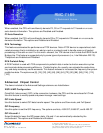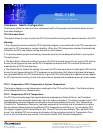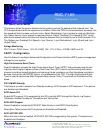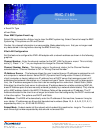
661 Brea Canyon Rd., Suite 3
Walnut, CA 91789
tel: 909.598.7388, fax: 909.598.0218
© Copyright 2009 Acnodes, Inc.
All rights reserved. Product description and product specifications
are subject to change without notice. For latest product information,
please visit Acnodes’ web site at www.acnodes.com.
RMC 7189
1U Rackmount System
ICH RAID CodeBase (Available if RAID is selected above)
Select Intel to enable Intel's SATA RAID firmware to configure Intel's SATA RAID settings. Select
Adaptec to enable Adaptec's SATA RAID firmware to configure Adaptec's SATA RAID settings. The
options are Intel and Adaptec.
SATA AHCI (Available if either RAID or AHCI is enabled under"Configure SATA#1 as" above)
Select Enable to enable the function of Serial ATA Advanced Host Interface. (Take caution when using
this function. This feature is for advanced program- mers only.)
IDE Detect Timeout (sec)
Use this feature to set the time-out value for the BIOS to detect the ATA, ATAPI devices installed in the
system. The options are 0 (sec), 5, 10, 15, 20, 25, 30, and 35.
XPCI/PnP Configuration
This feature allows the user to set the PCI/PnP configurations for the following items:
Clear NVRAM
This feature clears the NVRAM during system boot. The options are No and Yes.
Plug & Play OS
Selecting Yes allows the OS to configure Plug & Play devices. (This is not required for system boot if
your system has an OS that supports Plug & Play.) Select No to allow the AMI BIOS to configure all
devices in the system.
PCI Latency Timer
This feature sets the latency Timer of each PCI device installed on a PCI bus. Select
64 to set the PCI latency to 64 PCI clock cycles. The options are 32, 64, 96, 128, 160, 192, 224 and
248.
PCI IDE Bus Master
When enabled, the BIOS uses PCI bus mastering for reading/writing to IDE drives. The options are
Disabled and Enabled.
PCIe IO Performance
This feature allows the user to configure PCI-E slot settings to enhance perfor- mance. The default
setting is 128MB.
PCI SERR Function
PCI SERR (System Error) is for reporting address parity errors, or any other fatal system errors. It is
shared among all PCI devices. The options are Disabled and Enabled.


















